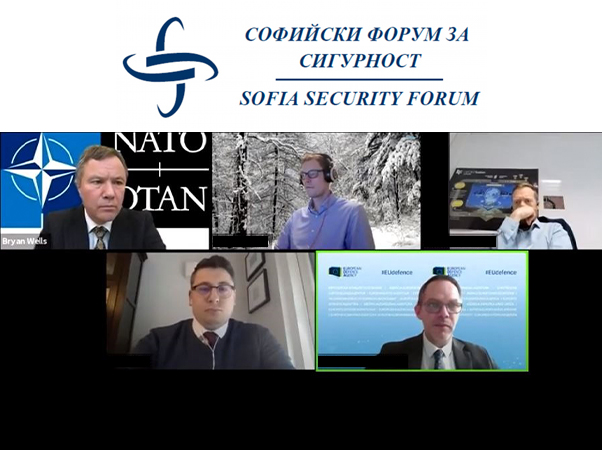 NATO Chief Scientist ,Dr Bryan Wells joined the webinar “AI based solutions for EU Military Missions and Operations” organaised by the Sofia security Forum. NATO Chief Scientist ,Dr Bryan Wells joined the webinar “AI based solutions for EU Military Missions and Operations” organaised by the Sofia security Forum.
Dr Wells gave a deep overview of the developing of Artificial Intelligence (AI) along history and of where AI Science is currently taking us in the defence security and military sphere.
Since its beginning, AI has moved through three development cycles: the initial period focused on rules-based approaches; the second cycle focused on the development and application of statistical methods; the third cycle of development focuses on the use of bio-inspired learning methods achieving a considerable success in the areas of sensing and perception.
Currently new interesting research areas are being developed:
- neuromorphic computing, to emulate the neural structure and operation of the human brain;
- machine learning to understand how to confuse AI systems;
- probabilistic computing, to deal with uncertainty, ambiguity, and contradiction in the natural world.
- new machine and deep learning algorithms based on quantum information science and quantum computers.
Dr Wells also highlighted that AI plays a key role in military capabilities and forces especially through the use of embedded AI in other associated technologies such as virtual/augmented reality; quantum computing; autonomy; modelling & simulation; space; materials research; manufacturing &logistics; and, big data analytics. AI has also a relevant impact on medical area, in fact, modern military forces require clinically relevant and empirically validated medical interventions and associated procedures and AI has the potential to assist in their developments.
Also, AI will have a transformative effects and a strategic impact on nuclear, aerospace, cyber, materials and bio-technologies and on introduction of nuclear weapons.
Dr Wells also talked about three points of vulnerability for AI: Cyber-attacks; Information and Aberrant Behaviour. These threats require our attention.
As AI-development become increasingly diffused, the need to define interoperability, data and specialised communication standards will become vital. AI is one of the seven Emerging disruptive technologies (EDTs) NATO has taken a specific interest in and it has been identified as one of the biggest technological challenges for Alliance nations but NATO’s scientific network it well prepared to face it.
To learn more, watch Dr Wells’s speech.
|